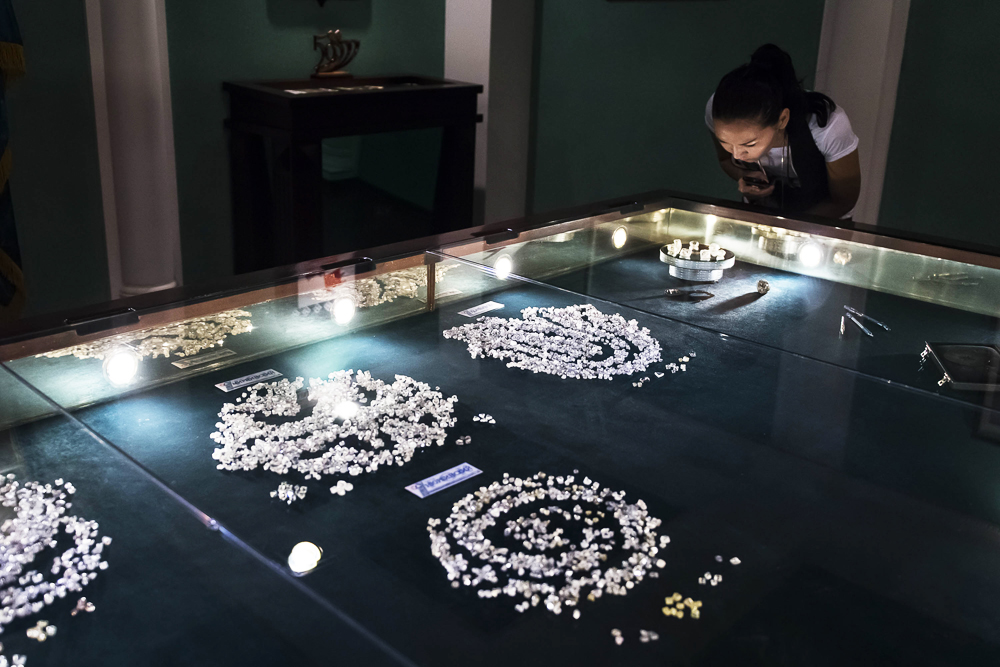Russia eyes $12.6 billion windfall from privatization of state companies

Alrosa's diamond sorting center in Yakutia.
Anatoliy Strunin/TASSAt the beginning of 2016 the Russian government announced a large privatization plan, which it hopes will bring 1 trillion rubles ($12.6 billion) into the state coffers in the next two years. This year the plan includes the sale of shares in two oil companies, Rosneft and Bashneft, as well as a share package in one of the largest state banks, BTV, and the Alrosa diamond company.
At the end of April 2016 the privatization format of the first company on the list was determined. According to the Vedomosti business newspaper, the government has decided to sell off 10.9 percent of Alrosa, Russia's largest diamond mining company, on the Moscow Stock Exchange.
The schedule for the sale of the package has not been specified. Earlier, the government considered selling the package to a strategic partner. However, the company itself has requested public privatization.
"The sale of the shares on the stock exchange will help receive a higher evaluation and attract a large circle of interested investors," explained Maxim Chernyayev, chief economist at Novas Energy Services, an oil service company.
According to a Vedomosti source, the government expects to earn more than 50 billion rubles ($754 million) from the sale.
In the near future the fate of oil companies Rosneft and Bashneft will also be decided. Minister of Economic Development Alexei Ulyukayev said earlier that 19.5 percent of Rosneft's shares may be sold in parts, adding that the government expects to receive 650 billion rubles ($9.7 billion) from this deal.
Who's interested in the shares?
Meanwhile, those wishing to buy shares in the oil companies have voiced their interest. The potential buyers of Rosneft and Bashneft shares have already begun talks with the Russian government, said Deputy Prime Minister Igor Shuvalov at a press conference on April 25.
On April 21 the Chinese National Petroleum Corporation (CNPC) announced that it may participate in the privatization of Rosneft. The possible shares that CNPC could purchase will be discussed between the heads of the Russian and Chinese governments.
Concerning Bashneft's share package, for now only Russian investors, including Lukoil, Russia's second largest oil company in terms of production volumes, has demonstrated interest.
It is important to note that Bashneft became state property only in 2014. Before that 71.6 percent of the shares belonged to Sistema, a large Russian holding company, and its subsidiaries.
"The company's shares are undervalued. Looking at Bashneft's main financial indicators in the last three years, you can conclude that it is attractive for investment," said Maxim Chernyayev.
According to Bloomberg, Bashneft's capitalization is $6.47 billion. Chernyayev believes that not only Chinese investors are interested in the privatization of Russian state companies.
"Probably our European and trans-Atlantic partners are also considering possible ways of purchasing shares in Alrosa, Rosneft and Bashneft," he said.
In his words, the privatization will most likely go through affiliate participants – that is, European investors will be able to purchase the shares through mediators.
Conditions for foreigners
According to head of the investment department at BKS Maxim Shein, foreign investors will be able to participate in the privatization only on the condition that they register their subsidiary in Russia – part of the privatization rules introduced by Russian President Vladimir Putin on Feb. 1, 2016.In accordance with these conditions, share purchasers must be under Russian jurisdiction and the shares must be bought either with one's own money or with credit received from non-state banks. The most important condition is that control over the strategic enterprises must remain with the Russian state.
All rights reserved by Rossiyskaya Gazeta.
Subscribe
to our newsletter!
Get the week's best stories straight to your inbox

